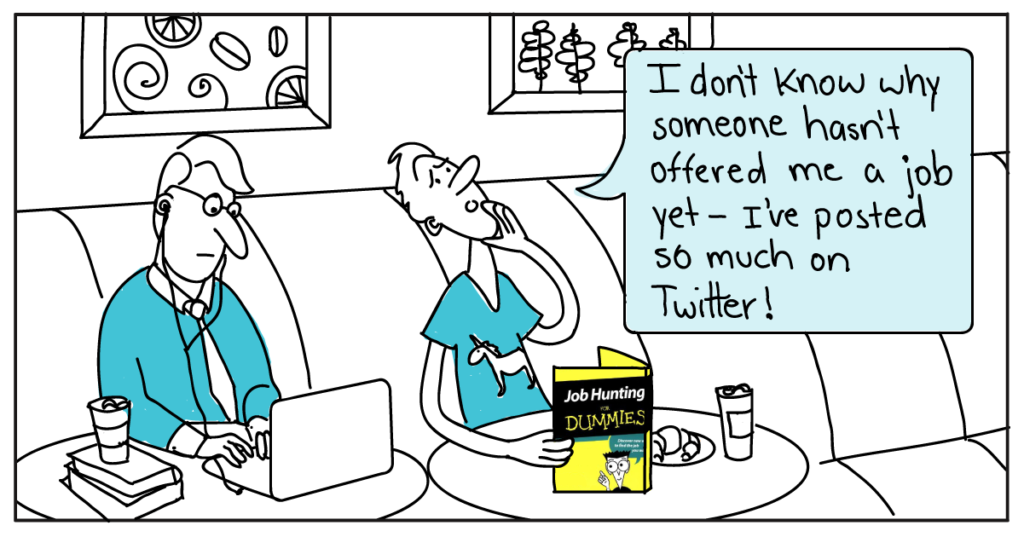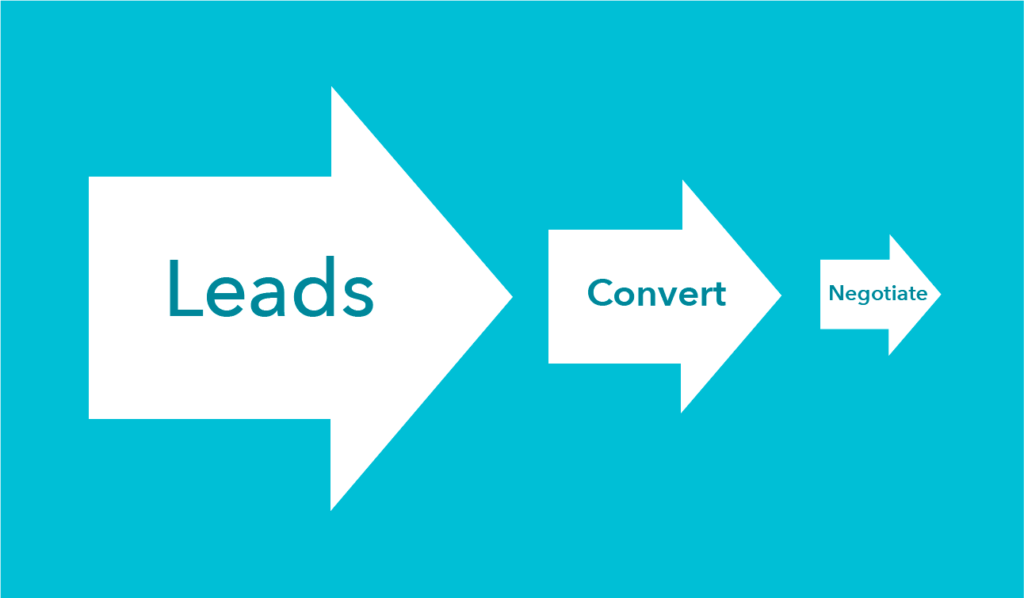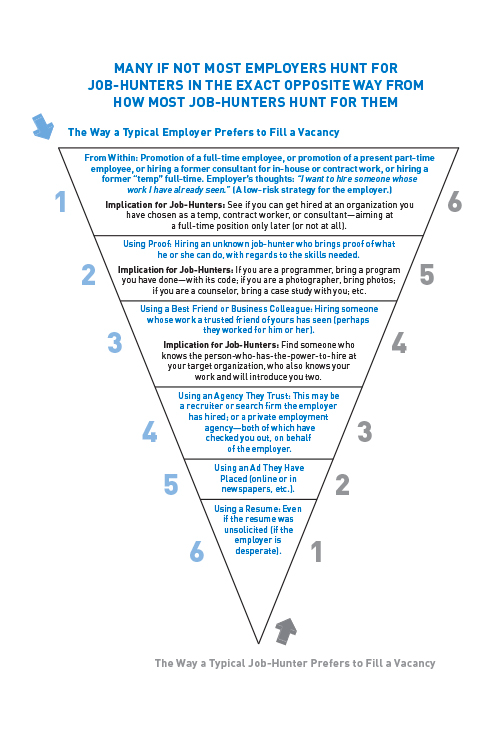
When it comes to advice on how to get a job, most of it is awful.
- CollegeFeed suggests that you “be confident” as their first interview tip, which is a bit like suggesting that you should “be employable”.
Many advisers cover the “clean your nails and have a firm handshake” kind of thing.
A coach on AOL says that “you need business cards in your pocket at all times.” Which is great advice for job applicants who are so qualified that strangers at parties want to hire them, if only they had their email address.
A career expert in TIME magazine advises that “By writing blog posts and updating your social status routinely, recruiters will find you when they are looking to hire for a position. As long as your profiles are connected to what you’re passionate about, you will attract the right jobs and repel the wrong ones.”1
So post on Twitter a lot and you’ll magically attract the right jobs, right?
Over the last five years, we’ve sifted through this bad advice to find the nuggets that are actually good. We’ve also provided one-on-one coaching to hundreds of people who are applying for jobs, and we’ve hired about 20 people ourselves, so we’ve seen what works from both sides. Here, we’ll sum up what we’ve learned.
The key idea is that getting a job is about convincing someone that you have something valuable to offer. Ultimately, it’s a sales process. So you should focus on doing whatever employers will find most convincing. That means instead of sending out lots of CVs, focus on getting recommendations and proving you can do the work. Read on to get a step-by-step guide. (And at the bottom is the end of the career guide.)
Watch this video or read the full article below (15 minutes).
The bottom line
- Get lots of leads, especially by asking for introductions.
- Prove you can do the work by actually doing it. Do a project before the interview, explain exactly how you can solve their problems or seek a related position first.
- Once you get an offer, negotiate.
- Do whatever it takes to keep yourself motivated e.g. make a public commitment to apply to one position per day or find a partner to search for jobs alongside.
Table of Contents
- 1 Stage 1: Leads
- 2 Stage 2: Conversion
- 3 Stage 3: Negotiation
- 4 Stay motivated
- 5 Check out our advice on different jobs
- 6 Never job hunt again
- 7 Conclusion
- 8 New to 80,000 Hours?
- 9 Otherwise, we have one final important piece of advice below
- 10 What now? Make your plan.
- 11 Already made a plan? Don’t go it alone

Let’s be blunt. You’re not entitled to a job, and hiring is rarely fair. Rather, getting a job is, at root, a sales process. You need to persuade someone to give you responsibility and a salary, and even put their reputation on the line, in exchange for results.
How to improve at sales is a huge topic, so we’ll just list our key advice for each stage of the process: (1) finding opportunities (leads) (2) convincing employers (conversion) and, (3) negotiating. The common theme is to think from the employer’s point of view, and do whatever they will find most convincing.
While the rest of our career guide is about working out which job is best for you and the world, here we focus on the practicalities of taking action on your plans. Just bear in mind there’s no point using salesmanship to land a job that you wouldn’t be good at – you won’t be satisfied, and if your performance is worse than the next best applicant, you’ll be having a negative impact. We wrote this article to prevent the opposite situation: we’ve seen too many great candidates who want to make a difference failing to live up to their potential because they don’t know how to sell themselves.

Stage 1: Leads
A lead is any opportunity that might turn into a job, like a position you could apply to, a friend who might know an opportunity, or a side project you might be able to get paid for.
You need lots of leads
We interviewed someone who’s now a top NPR journalist. But when he started out, he applied to 70 positions and got only one offer that paid over $10,000.
This illustrates the first thing to know about leads: you probably need a lot of them. It usually takes 20 to 100 to find one good job, and getting rejected 20 times is normal. In fact, the average length of a spell of unemployment in the U.S. as of February 2016 is seven months, so be prepared for your job hunt to take that long.2
However, there’s a lot you can do to raise your chances of success, which is what we’ll now cover.
How to get leads: Don’t just send your CV in response to job listings, use connections
Many large organisations have a standardised application process e.g. the civil service, consulting and Teach for America. They want to keep the process fair, so there isn’t much wiggle room. In these cases, just apply.
But what do you do after that? The most obvious approach is to send your CV to lots of companies and apply to the postings on job boards. This is often the first thing career advisers mention.3
The problem is that sending out your CV and responding to lots of Internet job ads has a low success rate. The author of the best selling career advice book of all time, Dick Bolles, estimates that the chance of landing a job from just sending your resume to a company is around 1 in 1000.4 That means you need to send out one hundred resumes just to have a 10% chance of landing a job.
Moreover, the positions on job boards tend to be highly standardised and at large companies. That’s because job listings work best for standardised positions. And because they’re well advertised, they tend to be competitive, receiving hundreds of applications.
The best opportunities are hidden away and personalised to you. You need a different way to find them.
The key is to use the methods of getting leads that employers like best. Employers prefer to hire people they already know, or failing that, to hire through referrals – an introduction from someone they know.
Think about it from their point of view. Which would you prefer: a recommendation from someone you trust, or 20 CVs from people who saw your job listing on indeed.com? The referral is more likely to work, because the person has already been vouched for. It’s less effort — screening 20 people you know nothing about is hard. Referrals also come from a better pool of applicants — the most employable people already have lots of offers, so they rarely respond to job listings.
For these reasons, many recruiters consider referrals to be the best method of finding candidates.4
But job seekers usually get things backwards — they start with the methods that recruiters least like.

Moreover, applicants find around 50% of jobs through connections, and many are never advertised. So if you don’t pursue referrals, you’ll miss many opportunities.
How to get referrals
You need to master the art of asking for meetings and introductions. We’ve put together a list of some of the best email scripts we’ve found.
Here’s a step-by-step process on how to handle each type of connection. If you’re not applying for a job right now, you can skip this section until you are.
- First, update your LinkedIn profile. This isn’t because you’ll get great job offers through LinkedIn — that’s pretty rare — it’s because people who are considering meeting you will check out your profile. Focus your profile on your most impressive accomplishments. Be as concrete as possible e.g. “ranked third in the nation”, “increased annual donations 100%”. Cut the rest; it’s better to have 2 impressive achievements than 2 impressive achievements and 3 weak ones. Finally, search yourself on Google and do anything you can to make the results look good (e.g. delete embarrassing old blog posts). Here’s a guide.
If you already know someone in the industry who can hire people, then ask for a meeting to discuss opportunities in the industry. This is close to going directly to an interview, skipping all the screening steps that come before. Remember, there doesn’t need to be an open position – employers will often create positions for good people.
If you know them less well, ask for a meeting to find out more about jobs in the industry (an “informational interview”). If it goes well, ask them to introduce you to people who may be able to hire you, which is effectively getting a referral from this person. DO NOT ASK THEM for a job if you promised it was an informational interview.
When asking for more introductions, prepare a one sentence, specific description of the types of opportunities you’d like to find. A good example is something like: “an entry level marketing position at a technology startup in education”. Two bad examples are: “a job in software” or “a job that fits my skills”. Being concrete makes it easier for people to come up with ideas, so lean towards too narrow rather than too broad.
Failing the above steps, turn to the connections of your connections. If you have a good friend who knows someone who’s able to hire you, then you could directly ask that friend for a referral. The ideal is to ask someone you’ve worked for before where you performed really well.
If your connection is not able to refer you, then ask them to introduce you to people in the industry who are able to hire. Then we’re back to informational interviews as in step two.
To find out who your connections know, use LinkedIn. Say you want to work at Airbnb. Go to LinkedIn and search “Airbnb”. It’ll show a list of all your contacts who work at Airbnb, followed by connections of connections who work at Airbnb. I just did this and found that I share 31 connections with someone who’s an engineer there. I could probably contact him directly. I also share one mutual connection with a recruiter at Airbnb, so I could ask for an introduction to her.
Remember, if you have 100 LinkedIn connections, and each of them has 100 connections that don’t overlap with the others, then you can reach at least 10,000 people using these methods.
There are lots of people in the 80,000 Hours Linkedin group who are happy to give advice on applications, and may be able to make introductions.
If you still haven’t got anywhere, then it may be worth spending some time building your connections in the industry first. Read our advice on how to network. Start with people with whom you have some connection, such as your university alumni, and friends of friends of friends (3rd order connections). Your university can probably give you a list of alumni who are willing to help in each industry. Otherwise you can resort to cold emailing. Here’s a guide to getting jobs with no connections. Here’s a guide to finding anyone’s email address.
Remember to use the scripts when asking for introductions.
Recruiters and listings
We prefer the above tactics, but recruiters can be worth talking to, and are often more effective than just making applications. Look for those who have a good network in the industry you’re interested in. If you want to work in an organisation with a social purpose, check out ReWork. There are also recruiters who specialise in new graduates e.g. GradQuiz (UK).
In case you want to browse job listings, which does sometimes work, and can be a useful way to get ideas, we listed the main sites in the footnotes.6
Stage 2: Conversion
When you’re in contact with someone who has the power to hire you, how do you convince them?
Again, think about it from their point of view. Once at 80,000 Hours, we were trying to hire a web engineer. Most applicants just filled out our application form, while one sent us a redesigned version of our career quiz with several good suggestions. Which application is more convincing? The person who sent the quiz was immediately in the top 20% of applicants, despite having very little formal experience.
Employers are looking for several qualities. They want employees who will fit in socially, stick around and not cause trouble. But most importantly, the employer wants to be sure that you can solve the problems they face. If you can prove that you’ll get the results the employer most values, everything else is much less important.
So how can you go about doing that?
When the process is standardised
Sometimes the process is highly standardised e.g. applying to Teach for America. In these cases, you have to jump through the hoops. Maximise your chances by finding out exactly what the process involves, and practicing exactly that. For instance, if it’s a competency interview, find out which competencies they look for, then have a friend ask you similar questions. Some public service organisations publish the rubrics they use to assess candidates.
The most useful thing you can do is find someone who recently went through the process, ask them how it works, and, if possible, practice the key steps with them. Sometimes there are books written about exactly how to apply.
Most employers, however, don’t have a fully standardised process. What do you do in those cases?
Do free work
Ideally, you’ve successfully done similar work in the past. If so, explain exactly how your past experience is relevant, the results you produced and why it proves you can do the work. For instance, if you’re trying to get hired as a marketer for a charity, explain a similar campaign you ran, and quantify your results in terms of dollars raised or people reached.
But if you’re at the start of your career, or switching sectors, then you won’t have similar experience to point to. Then what?
The basic idea is: do free work.
The most powerful way to prove you can do the work is to actually do some of it. And as we saw, doing the work is the best way to figure out whether you’re good at it, so it’ll help you to avoid wasting your own time too.
Here are four ways to put that into practice.
The pre-interview project
This is what the web engineer did with our career quiz, as above.
- Find out what you’d be doing in the role (this already puts you quite a way ahead).
- In particular, work out which problems you will need to solve for the organisation. To figure this out, you’ll probably need to do some desk research – here’s a simple guide – then speak to people in the industry.
- Spend a weekend putting together a solution to these problems, and send them to a couple of people at the company with an invitation to talk more.
- If you don’t hear back after a week, follow up at least once.
See some more examples in this article (8min read, also where we got the term “pre-interview project”).
The briefcase technique
A similar option is to bring out your preparation during the interview. Ramit Sethi calls this “the briefcase technique.”
- As above, work out the 3 to 5 problems you’ll need to solve in this role.
- Then write up a couple of pages on how you’d address these problems if you were in the role.
- During the interview, take these pages you have written out of your “briefcase” and present them to the interviewer.
Speaking from personal experience, we’ve overseen four years’ worth of competitive application processes at the Centre for Effective Altruism, and doing either of these would immediately put you in the top 20% of applicants, even if your suggestions weren’t that good. It demonstrates a lot of enthusiasm, and most people hardly know anything about the role they are applying for.
Trial period
If the employer is on the fence, you can offer to do a 2-4 week trial period, perhaps at reduced pay or as an intern. Say that you’re keen to work there and feel confident that you’ll work out. Make it clear that if the employer isn’t happy at the end, you’ll leave gracefully.
Only bring this out if the employer is on the fence, or it can seem like you’re underselling yourself.
Go for a nearby position
If you can’t get the job you want right away, consider applying to another position in the organization – like a freelance position, or a position one below the one you really want. Working in a nearby position gives you the opportunity to prove your motivation and cultural fit. When your boss has a position to fill, it’s much easier to promote someone he or she already worked with than to start a lengthy application process.
How to prepare for interviews
If you can convince an employer you can solve their problems by doing the work, you’re most of the way there, and you can ignore most of the interview advice out there. However, you won’t always have time to prepare, and there’s more you can do to become even more convincing.
Here’s the best advice we’ve found on preparing for interviews. It’s also useful for getting leads while networking. If you’re not actively looking for a job right now, feel free to skip this.
- When you meet an employer, ask lots of questions to understand their challenges. Discuss how you might be able to contribute to these challenges. This is exactly what great salespeople do. A survey of research on sales concluded “there is a clear statistical association between the use of questions and the success of the interaction.” Moreover, when salespeople were trained to ask more questions, it made them more effective.7
Prepare your three key three selling points ahead of meetings. These are the messages you’ll try to get in during the discussion. For instance: 1) I have done this work successfully before; 2) I am really excited about this company 3) I have suggestions for what I could work on. Writing these out ahead of time makes it more likely you’ll mention what’s most important, and it’s about the limit of what your audience will remember. That’s why this is standard advice when pitching a business idea. If you’re not sure what you have to offer, there’s an exercise at the end of part 3 to inventory your career capital.
Focus on what’s most impressive. What sounds better: “I advised Obama on energy policy” or “I advised Obama on energy policy, and have worked as a high school teacher the last three years”? Many people fill up their CVs with everything they’ve done, but it’s usually better to pick your one or two most impressive achievements and focus on those. It sounds better, it makes it more likely you’ll cover it, and it raises the chance that your audience will remember your points.
Prepare concrete facts and stories to back up your three key messages. For instance, if you’re applying to be a web engineer, rather than “I’m a hard worker”, try “I have a friend who runs an organisation that was about to get some press coverage. He needed to build a website in 24 hours, so we pulled an all nighter to build it. The next day we got 1,000 sign-ups”. Rather than say “I really want to work in this industry”, tell the story of what led you to apply. Stories and concrete details are far more memorable than abstract claims.8
Work out how to sum up what you have to offer in a sentence. Steve Jobs didn’t sell millions of iPods by saying they’re 30% better than mp3 players, but rather with the slogan “1000 songs in your pocket”. Having a short, vivid summary makes it easy for other people to promote you on your behalf. For instance “He’s the guy who advised Obama on climate policy and wants a research position.”
Prepare answers to the most likely questions. Write them out, then practice saying them out loud. The following three questions normally come up: (1) Tell me about yourself – this is an opportunity to tell the story of why you want this position and mention one or two achievements (2) Why do you want this position? (3) What are your questions for us? Then usually the interviewer will add some behavioural questions about the traits they care most about. These usually start “tell me about a time you…”, then are finished with things like: “exhibited leadership”, “had to work as a team”, “had to deal with a difficult situation or person”, “you failed”, “you succeeded.”
Practice the meeting, from start to finish. Meet with a friend and have them ask you five interview questions, then practice responding quickly. If you don’t have a friend to help, then say your answers out loud and mentally rehearse how you want it to go. Ask yourself what’s most likely to go wrong, and what you’ll do if that happens.
Learn. After each interview, jot down what went well, what could have gone better, and what you’ll do differently next time.
To learn more about sales, our top recommendation is SPIN selling, which is based on in-depth research by Neil Rackman.7
Stage 3: Negotiation
Negotiation begins after you have an offer, once the employer has said they’d like to hire you.
Most people are so happy to get a job, or awkward about the idea of negotiating, that they never try. But ten minutes of negotiation could mean major benefits over the next couple of years. So actually consider doing it.
For instance, you could ask the employer to match your donations to charity. That could mean thousands of dollars of extra donations per year, making those ten minutes you took to negotiate the most productive of your life.
You could also negotiate to work on a certain team, have more flexible hours, work remotely, or learn certain skills. All of these could make a big difference to your day-to-day happiness and career capital.
Negotiation is not always appropriate. Don’t do it if you’ve landed a highly standardised offer, like a civil service position — they won’t be able to change the contract. Also don’t do it if you’re only narrowly better than the other candidates or have no alternatives. And definitely don’t negotiate until the employer has made an offer — it looks really bad to start negotiating during the interview.
However, we think negotiation should be tried in most cases. Hiring someone takes months and consumes lots of management time. Once an employer has made an offer, they’ve invested many thousands of dollars in the process. The top candidate is often significantly better than the next best. This means it’s unlikely that they’ll let the top candidate get away for, say, a 5% increase in costs.
It’s even more unlikely that they’ll retract their initial offer because you tried to negotiate. Stay polite, and the worst case is likely that they’ll stick to their original offer.
Negotiation should be most strongly considered when you have more than one good offer, because then you have a strong fallback position.
How to negotiate
Explain the value you’ll give the employer, and why it’s justified to give you the benefits you want. The idea is to look for objective metrics and win-win solutions – can you give up something the employer cares about in exchange for something you care about? For instance:
- I’m going to redesign your sign up process, increasing the conversion rate by 1%, which is worth millions of dollars to you, so I’d like to be given donation matching up to $50,000. This is something I value, and the company can claim tax benefits on the donations.
- Other people with my level of experience in this industry are usually paid $50,000 and can work at home two days per week. But I’d prefer to work with you. Can you match the other companies?
- I’m really motivated to learn sales skills, so I’d like to work alongside person X. This will make me much more effective in the role in six months.
A huge amount has been written about salary negotiation, so this hardly scratches the surface. Here’s a good guide (30 minutes). Ramit Sethi also has tips (14 minute video and free pdf guide in exchange for newsletter sign up). If you want to get more advanced, check out the book Getting Past No by William Ury, who developed the negotiation course at Harvard Law School.
Negotiate after you’ve started
Once you start the job, try to perform as well as possible, and then negotiate again. Most employers will be very unwilling to lose someone who’s already doing excellent work for them. Just bear in mind, most companies have a standard review process, so wait until then to make your ask.
Stay motivated
The job search may be one of the hardest things you’ve ever done — you’ve probably never been rejected 30 times in a row before. And you may have to do most of it alone. It makes online dating look easy.
This means that you’ll need to throw every motivational technique you know at the job hunt. For example, set a really specific goal like speaking to five people each week until you have an offer, publicly commit to the goal, and promise to make a forfeit if you miss it. We know one job seeker who, although he is liberal, promised to donate to the Trump campaign if he missed his goal.
One of the most useful approaches our members have found is pairing up with someone else who’s also job hunting. Check in on progress, and share tips and leads. Alternatively, find someone who recently did a similar hunt and is willing to meet up and give you tips.
To get more practical tips on how to motivate yourself, check out the book The Motivation Hacker by Nick Winter. And we have another article that lists evidence-based ways to stay happy, productive and motivated.
Check out our advice on different jobs
The best way to get a job depends on the type of job you’re pursuing. Go to our career reviews and scroll to the end of the profile to see customised advice for each type of job.
Never job hunt again
Your job hunts will get easier and easier as you build career capital.
The most important thing you can do to put yourself in a better position is to gain more connections, so you can get better referrals.
After that, focus on developing strong skills and really kicking ass in your work. The best marketing is word of mouth — employers seeking you out rather than the other way around. If you’re great at your job, then people will actively want to refer you to employers, because it’s doing the employer a favor as well as you. Read our article on career capital to find out how to never have to job hunt again.
Conclusion
Getting a job can be an unpleasant process, but if you go through the steps in this article, you’ll give yourself the best chance of success. And that will make sure you fulfill your potential to find a satisfying career and contribute to the world.
New to 80,000 Hours?
This article is the last part of our career guide. Go to the start to see the rest.
Otherwise, we have one final important piece of advice below
Take a moment to congratulate yourself on getting this far.

Before we end, imagine for a minute that you’re at the end of your career. You’re on your deathbed looking back.

What are some things you might regret?
Perhaps you drifted into whatever seemed like the easiest option, or did what your parents did.
Maybe you even made a lot of money doing something you were interested in, and had a nice house and car. But you still wonder: what was it all for?
Now, what are some things won’t you regret?
You won’t regret exploring lots of options to find what works, rather than settling too early. You won’t regret building valuable skills that give you better options.
Most of all, you won’t regret being ambitious and tackling some of the world’s most pressing problems.
You can almost certainly make a major difference to hundreds of people’s lives over your career. Who can imagine saying on their deathbed: “I helped hundreds of people, but what was it all for?”
Fortunately, you have time. You have time to explore different careers, develop your skills, and find work that you’re good at and that contributes to the world.
But you shouldn’t wait to get started.
You have 80,000 hours in your career. Don’t waste them.
What now? Make your plan.
Tie everything together, make a plan, and take action.
Already made a plan? Don’t go it alone
One of the most powerful things you can do to have more impact is to meet others doing the same. Once you’ve read our guide, there’s thousands of people in our community who want to help you succeed. Here’s some ways to get involved.
Or if you’d like to read more, we have plenty more research — we admire your stamina!